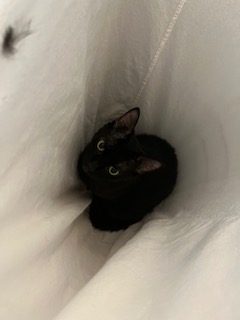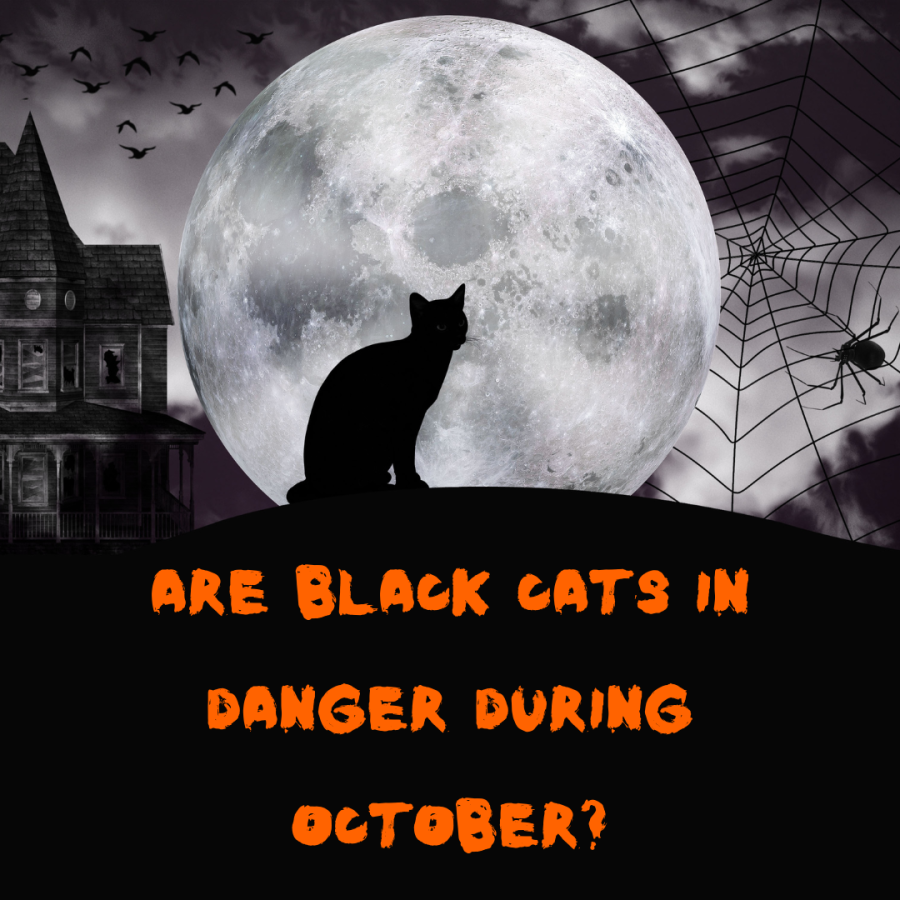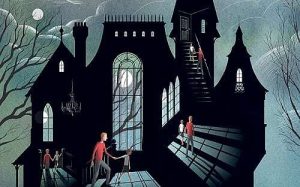Are Black Cats in Danger During October?
October 28, 2022
Every year around Halloween, social media posts begin to circulate about how owners of black cats need to be extra careful. Many of these posts, whether on Instagram, TikTok, or another platform, rarely allude to why. This fear that so many hold about the safety of these pets stems from many things. It’s often rooted in urban legends, personal experiences, statistics on cat mortality, and even the impact of the Satanic Panic of the 80s.
Urban Legends, Superstitions, and Myths
It may not immediately come to mind that these domestic housecats could be perceived as dangerous. Though, many urban legends and myths depicting black cats in this way are still subtly ingrained in many people’s minds. Call it superstition, pre-conceived notions, or something or other, but all can agree these older legends have a significant role in how these cats are looked at today. In regards to these superstitions, Green Hope Senior and black cat owner Katia Bagley says, “I don’t believe in those. Most people paint them to be bad luck, and my cat Paris has been the most loving creature and has gotten me through so much. So, if anything, she’s my lucky charm.”
Cats were important in many pre-Christian cultures, often worshipped as gods or seen as sacred beings. In the Middle Ages, the early Church was deadset on erasing all remaining symbolism from pagan religions. It is believed this was due to the Christians’ “do not worship false idols” ideology, where anything praised that did not have to do with their God (even cats) was sinful. Black cats ended up getting the brunt of this erasure. Throughout this period and into the age of Enlightenment, these cats were “tortured and burned alive just for having fur the color of night — which was, after all, when most witchery and evil took place.” The same (previously linked) article by T. J. Banks goes on to say how for Christians, “the black cat was always Lucifer’s messenger…”
Another piece called Why Black Cats are Associated with Halloween and Bad Luck reads: “Written records link black cats to the occult as far back as the 13th century when an official church document called “Vox in Rama” was issued by Pope Gregory IX on June 13, 1233. “In it, black cats were declared an incarnation of Satan,” says Layla Morgan Wilde…” This history makes apparent the reasons why so many people think black cats are bad luck or unholy. It also gives a little bit of clarity on why there is fear that they will be targeted around Halloween time.
The Satanic Panic
Some more recent history that contributes to this fear of black cats (and the fear for their safety) took place in the 1980s. Named “The Satanic Panic”, this period is known as a mass panic that took place in the U. S. over conspiracy theories surrounding satanic cults. An article from the New York Times describes this time: “Early in the 1980s, baseless conspiracy theories about cults committing mass child abuse spread around the country. Talk shows and news programs fanned fears, and the authorities investigated hundreds of allegations. Even as cases slowly collapsed and skepticism prevailed, defendants went to prison, families were traumatized and millions of dollars were spent on prosecutions.”
In regards to animals (such as the black cat), there were multiple reported cases of satanic animal sacrifices during this period that furthered the public’s fear of the devil and his alleged incarnations. In 1984, widespread rumors of animal sacrifices in Edinburg, Illinois were attributed to a teenage “devil-worshipping” cult. Similarly, in 1986, mutilated animals were found in Modesto, California, and were attributed to another “devil-worshipping” group. The memory of these events may live on with individuals warning black cat owners to keep an eye on their pets in October.
The media played a big role in fueling this fire and reported on Satan worship that consisted of ritualistic animal mutilation, rock music associated with the devil, satanic graffiti, and backward satanic messages in pop songs. Though, the link between the alleged ‘satanic’ crimes that were happening and satanic cults was largely speculative. Even so, the influence of this period lives on today. Rumors were dispelled and the accused were proven innocent, but no one could seem to permanently erase their association of certain things with Satanism.
Animal Abuse Horror Stories: A Cause For Concern
Keeping in mind the context of these urban legends and conspiracy theories of the past, it’s no surprise that many groups are advocating for the safety of black cats during Halloween time. PETA in particular reports on many of these crimes against cats during this time of year, alluding to Satanic rituals (that Halloween fuels) as the main culprit. In one article on their website called “PETA’s True Halloween Horror Stories About Cats Allowed to Roam Outdoors”, many graphic instances of animal abuse are outlined. To name a few headlines, “Scalped Black Cat Left on Owner’s Front Lawn”, “Woman Finds a Burnt, Cut-Up Black Cat Inside a Bag on Halloween”, “Black ‘Outdoor Cat’ Shot-May Have Lost a Leg”, “A Black Cat and Several Other Cats Were Shot in the Face With Darts”, and the list goes on. Keeping in mind stories such as these, owners of black cats all have their own opinions on what’s best for their pets around this time of year. When asked how they felt about letting their cat outside around Halloween, Katia responded in alignment with the PETA article: “I do not let my cat out on Halloween because I do not feel like she’s safe. I’ve read too many articles about people killing cats.”
The article also includes information on animal shelters suspending black cat adoptions ahead of Halloween due to past incidents of extreme animal abuse occurring around this time of year. When asked their thoughts on these cautionary measures, Katia said “I don’t think they need to do that, but it depends on the area. As long as the animal shelters are safe I think adopting them (black cats) out should be fine. I think people should adopt black cats more.” Although the argument that correlation doesn’t equal causation in these situations (the correlation of black cats being killed around Halloween not necessarily meaning the holiday is the catalyst) is valid, these stories are still a cause of concern for pet owners who let their animals roam outside at any time of the year.
Statistics Say They’re Safe
An article from Alley Cat Allies brings to light a different viewpoint. They bring up their logic that keeps in mind statistics on cat killings, and how we as humans tend to make the most memorable (often awful) events the most prominent in our minds. The article reads: “First, you should know that there is no data to support the notion that black cats, or any cats, are harmed more often on Halloween than on any other day. In the disturbing cases in which cats have been attacked, those stories are powerfully imprinted on our memory. However, there is no evidence this is a widespread problem.” This would dispel the point of PETA’s listing of all the worst crimes against black cats during October because although these events are terrible and did happen, they are not so often that there is a significant reason to worry about your pet anymore around Halloween than any other day of the year.
What Should You Do?
Overall, the big dispute at hand is not whether cats are abused by humans, but whether Halloween time causes an increase in these crimes, and what parts of history could possibly lend a hand in this. It’s wise to do your own research about crimes like the ones mentioned happening in your area and to make the best decision for your pet based on this. That said, if you do think your cat is at risk because of superstitions or satanic cults, there’s no harm in keeping them inside for one night.









